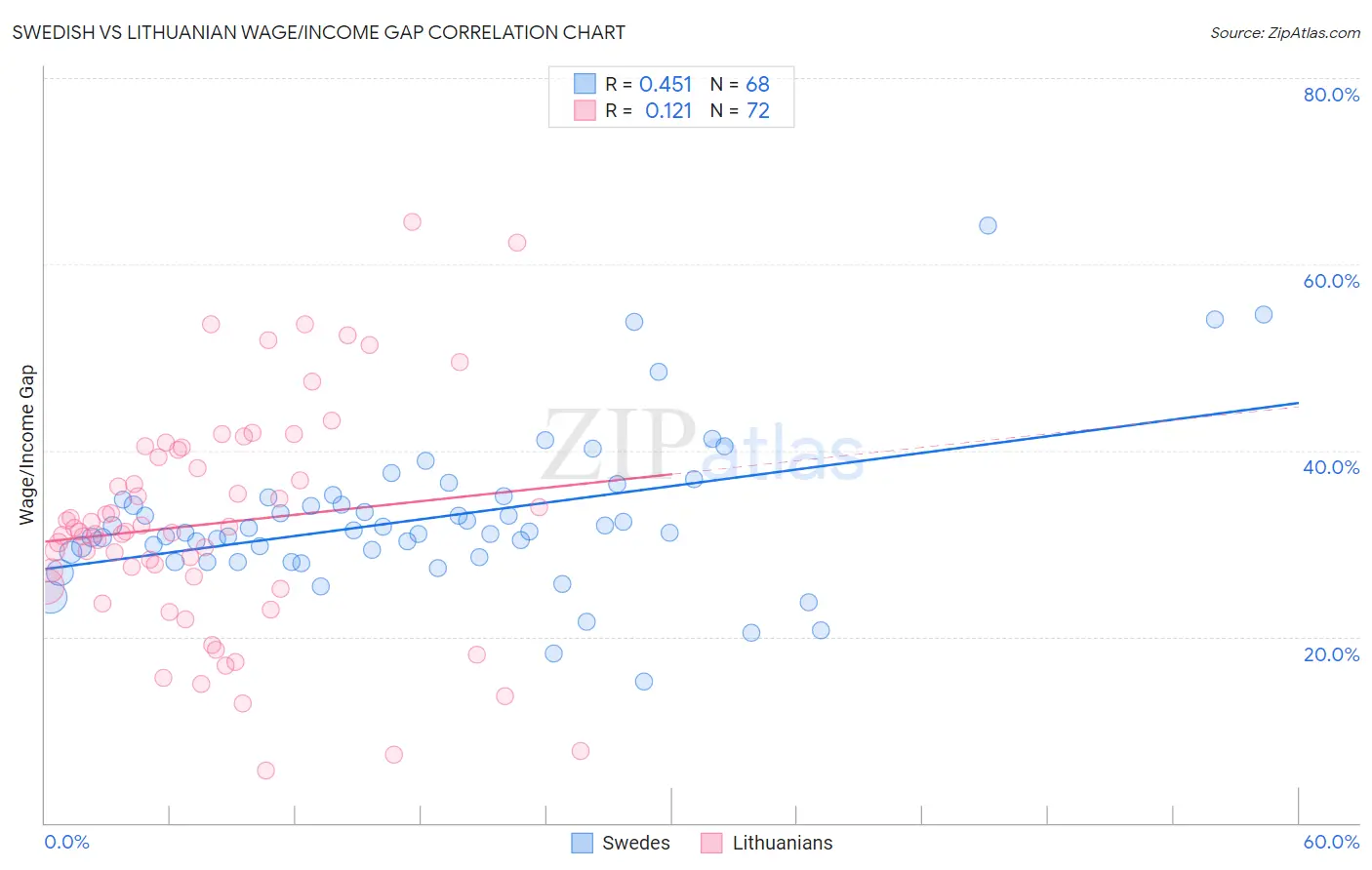Swedish vs Lithuanian Wage/Income Gap
COMPARE
Swedish
Lithuanian
Wage/Income Gap
Wage/Income Gap Comparison
Swedes
Lithuanians
29.4%
WAGE/INCOME GAP
0.0/ 100
METRIC RATING
334th/ 347
METRIC RANK
28.7%
WAGE/INCOME GAP
0.1/ 100
METRIC RATING
316th/ 347
METRIC RANK
Swedish vs Lithuanian Wage/Income Gap Correlation Chart
The statistical analysis conducted on geographies consisting of 537,447,925 people shows a moderate positive correlation between the proportion of Swedes and wage/income gap percentage in the United States with a correlation coefficient (R) of 0.451 and weighted average of 29.4%. Similarly, the statistical analysis conducted on geographies consisting of 421,511,979 people shows a poor positive correlation between the proportion of Lithuanians and wage/income gap percentage in the United States with a correlation coefficient (R) of 0.121 and weighted average of 28.7%, a difference of 2.4%.

Wage/Income Gap Correlation Summary
| Measurement | Swedish | Lithuanian |
| Minimum | 15.2% | 5.6% |
| Maximum | 64.2% | 64.5% |
| Range | 49.0% | 58.9% |
| Mean | 32.7% | 32.1% |
| Median | 31.2% | 31.3% |
| Interquartile 25% (IQ1) | 28.8% | 25.9% |
| Interquartile 75% (IQ3) | 34.8% | 39.7% |
| Interquartile Range (IQR) | 6.1% | 13.8% |
| Standard Deviation (Sample) | 8.2% | 12.1% |
| Standard Deviation (Population) | 8.1% | 12.0% |
Demographics Similar to Swedes and Lithuanians by Wage/Income Gap
In terms of wage/income gap, the demographic groups most similar to Swedes are Immigrants from Taiwan (29.5%, a difference of 0.13%), European (29.4%, a difference of 0.14%), Immigrants from South Central Asia (29.3%, a difference of 0.34%), Czech (29.2%, a difference of 0.84%), and German (29.2%, a difference of 0.89%). Similarly, the demographic groups most similar to Lithuanians are Maltese (28.7%, a difference of 0.010%), Belgian (28.8%, a difference of 0.11%), Basque (28.8%, a difference of 0.16%), Slovak (28.9%, a difference of 0.47%), and British (28.9%, a difference of 0.53%).
| Demographics | Rating | Rank | Wage/Income Gap |
| Maltese | 0.1 /100 | #315 | Tragic 28.7% |
| Lithuanians | 0.1 /100 | #316 | Tragic 28.7% |
| Belgians | 0.1 /100 | #317 | Tragic 28.8% |
| Basques | 0.1 /100 | #318 | Tragic 28.8% |
| Slovaks | 0.1 /100 | #319 | Tragic 28.9% |
| British | 0.1 /100 | #320 | Tragic 28.9% |
| Welsh | 0.1 /100 | #321 | Tragic 28.9% |
| Immigrants | Singapore | 0.1 /100 | #322 | Tragic 28.9% |
| Norwegians | 0.1 /100 | #323 | Tragic 29.0% |
| Croatians | 0.0 /100 | #324 | Tragic 29.0% |
| Hungarians | 0.0 /100 | #325 | Tragic 29.0% |
| Immigrants | Belgium | 0.0 /100 | #326 | Tragic 29.0% |
| Immigrants | Iran | 0.0 /100 | #327 | Tragic 29.1% |
| Scandinavians | 0.0 /100 | #328 | Tragic 29.1% |
| Scottish | 0.0 /100 | #329 | Tragic 29.1% |
| Germans | 0.0 /100 | #330 | Tragic 29.2% |
| Czechs | 0.0 /100 | #331 | Tragic 29.2% |
| Immigrants | South Central Asia | 0.0 /100 | #332 | Tragic 29.3% |
| Europeans | 0.0 /100 | #333 | Tragic 29.4% |
| Swedes | 0.0 /100 | #334 | Tragic 29.4% |
| Immigrants | Taiwan | 0.0 /100 | #335 | Tragic 29.5% |